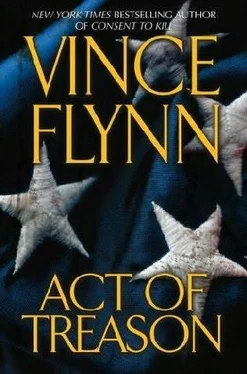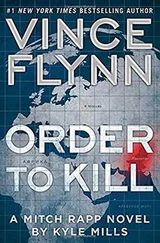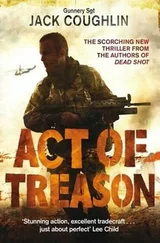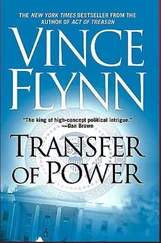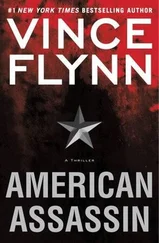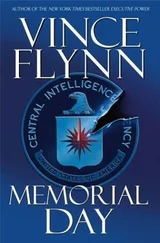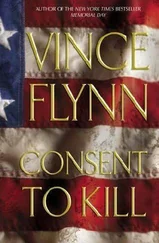Hovering in no-man’s-land was untenable, so Rapp made his decision. He moved to the top step staying as low as possible, and stepped over the dead Russian. Hugging the wall he moved down the corridor a few steps and settled against the outside wall of Gazich’s office. The hallway was like a sewer culvert. The farther he went the darker it became. Rapp looked to the end. He could barely make out the dark wood frame of a door against the yellowed plaster walls. If the third floor was set up the same as the second floor, that was where the bathroom would be and maybe the access to the roof. There was one more door directly across the hall from him. That was the other office suite. Rapp had no idea who it belonged to. All he cared about was that the place was empty.
He was thinking of Coleman and was about to ask for an ETA when Gazich’s office door opened, throwing a splash of light into the dark corridor. Rapp’s pistol was up and aimed in the flash of a half second. He took three silent steps back, retreating farther into the darkness, both hands gripping the weapon. A solid immovable base. Three neon green dots lined up in a perfect row, the pad of his left forefinger resting gently on the trigger.
The old man appeared. He stepped into the hallway, closing the door behind him. He stood there for a five count, his left hand still holding the doorknob, his chin slowly sinking until it rested on his chest. It was a posture of contemplation. He was a man trying to gather his thoughts before he decided what to do. He held the pose for just a second longer and then with a shake of his head, he bent over and grabbed the feet of the dead Russian. The first tug did nothing. The second tug moved the body maybe a few inches. The third tug was more of an all-out yank. The old man really leaned into it and the body started sliding across the worn linoleum floor.
Rapp matched him step for step, with little worry that he would be detected. The old man was preoccupied in thought and deed and probably mostly deaf from working an espresso machine his entire life. They retreated almost to the end of the hallway, where the old man gave up and dropped the Russian’s lifeless feet. They thudded against the floor, one of the shoes falling partially off. The old man swore and bent over, placing his hands on his knees. He made no effort to put the shoe back on. He was too exhausted. He stayed where he was breathing heavily and cursing to himself.
Rapp silently slid the pistol into the inside pocket of his jacket and extracted a folding knife from his belt. With one hand, he opened the knife and took a step forward. He hovered for a second, waiting for the old man to make his next predictable move. When he finally stood, Rapp lunged forward, clamping his right hand around the man’s mouth while pulling him up and nearly off his feet. The knife hand came around and Rapp pressed the flat edge of the blade against the man’s throat.
“Don’t make a sound,” Rapp whispered, his mouth only inches from the man’s left ear, “or I’ll slit your throat.”
Rapp had no idea how involved the old man was in all of this. He’d had ample time to think about it over the last day. He had obviously tipped off Gazich about the Russians and now he was helping him again, but this was not necessarily proof that he had been involved in what had happened in America back in October. Not by a long shot. Helping get rid of the bodies was in his own self-interest, regardless of any involvement with Gazich. He had to run a business, and in a resort town like Limassol, a few dead Russians found on your property could spell real trouble.
Then again, he could be Gazich’s business partner. Complicit in every action. Maybe he was the one who negotiated the contracts. Almost anything was possible, and until Rapp had proof, one way or the other, the old man would live. In no way, shape, or form was Mitch Rapp the picture of mental health, but through it all-the killings, the torturing, violence piled upon cruelty-he’d managed to stay relatively sane. The answer lay in the fact that he was different from the men, and yes, the occasional woman he hunted.
Many of them killed for an idea. Often, the idea was a perversion of Islam. These were all men. No women were allowed to join their crusade of intolerance. Yes, occasionally the Palestinians had used female suicide bombers, and so had the Chechens, but they were few. Others killed for a paycheck, like Gazich. Some of them, the ones who did their job with precision and avoided harming innocents, Rapp was indifferent toward. Gazich was not one of them. What he had done crossed the line by leaps and bounds. He was a terrorist not an assassin. He proved that when he set off the car bomb in Georgetown killing nineteen people, seriously wounding another thirty-four, and ruining the lives of who knew how many more. And who was the target in this case? Was it a corrupt arms dealer, a narco trafficker, a sponsor of terrorism? No, the target was two political candidates. And what was their crime? Did they preach death to Islam and the Arab world? Did they advocate the wholesale murder of every Palestinian? No. They did no such thing.
That was what the mullahs and clerics preached in places like Iran and Saudi Arabia. Death to America, the Great Satan. Death to Israel. Nuke the entire Zionist state and push the infidels into the ocean. These two liberal politicians, on the other hand, preached tolerance and acceptance every chance they got. They advocated real statehood for Palestine and sincere respect for religious diversity. And what did they get for it? They got some crazy Islamic fascist like Osama and his ilk putting a price tag on their heads.
Rapp still recalled the anger he’d felt while sitting in his hotel room in Calcutta months before. Sky News showed footage of the crater left by the car bomb. Rapp had been up and down that street at least a thousand times. From the size of the hole alone he knew it had been a powerful bomb. The death count was sure to be high. The next set of images provided by Sky News came from Muslim cities across the Middle East and beyond. They were all a slight variation on the same theme. Young men clogged the streets. Again, no women. American flags burned, Molotov cocktails were thrown at U.S. embassies, cars were torched, and men chanted, cheered, and danced. All in celebration that the Great Satan had been dealt a grievous blow.
The fact that so many could so brazenly celebrate such a barbarous act snapped Rapp back to reality. This clash of cultures trivialized his pain and anguish. The images on the TV that evening in Calcutta crystallized for him what was at stake. The only time you ever saw anything like this in America was when Detroit won an NBA title. And they were merely celebrating their home team’s victory. Not the indiscriminate destruction of human life.
The old man would live. That was how Rapp was different from Gazich. He didn’t simply eliminate innocent people because they were in the way of his objective. Yes, Rapp was capable of restraint when the situation called for it, but he was equally capable of committing acts of sheer, ruthless violence. Gazich would die. But before he drew his last breath he would talk.
“Down on your knees,” Rapp whispered.
He kept his right hand on the man’s mouth and the knife at his throat as the man got down on one knee and then the other.
“I’m going to take my hand off your mouth,” Rapp whispered, “but the knife is going to stay at your throat.” Rapp took the point of the knife and jabbed the tip into the fleshy skin just beneath the old man’s Adam’s apple. The steel point slid through the first two layers of skin, drawing a drop of blood.
“That’s your voice box. Keep your mouth shut until I tell you to open it. If I see your lips begin to move, the knife goes all the way in, and I promise you whatever it was that you were going to say is going to die right there in your throat. Nod if you understand.”
Читать дальше
